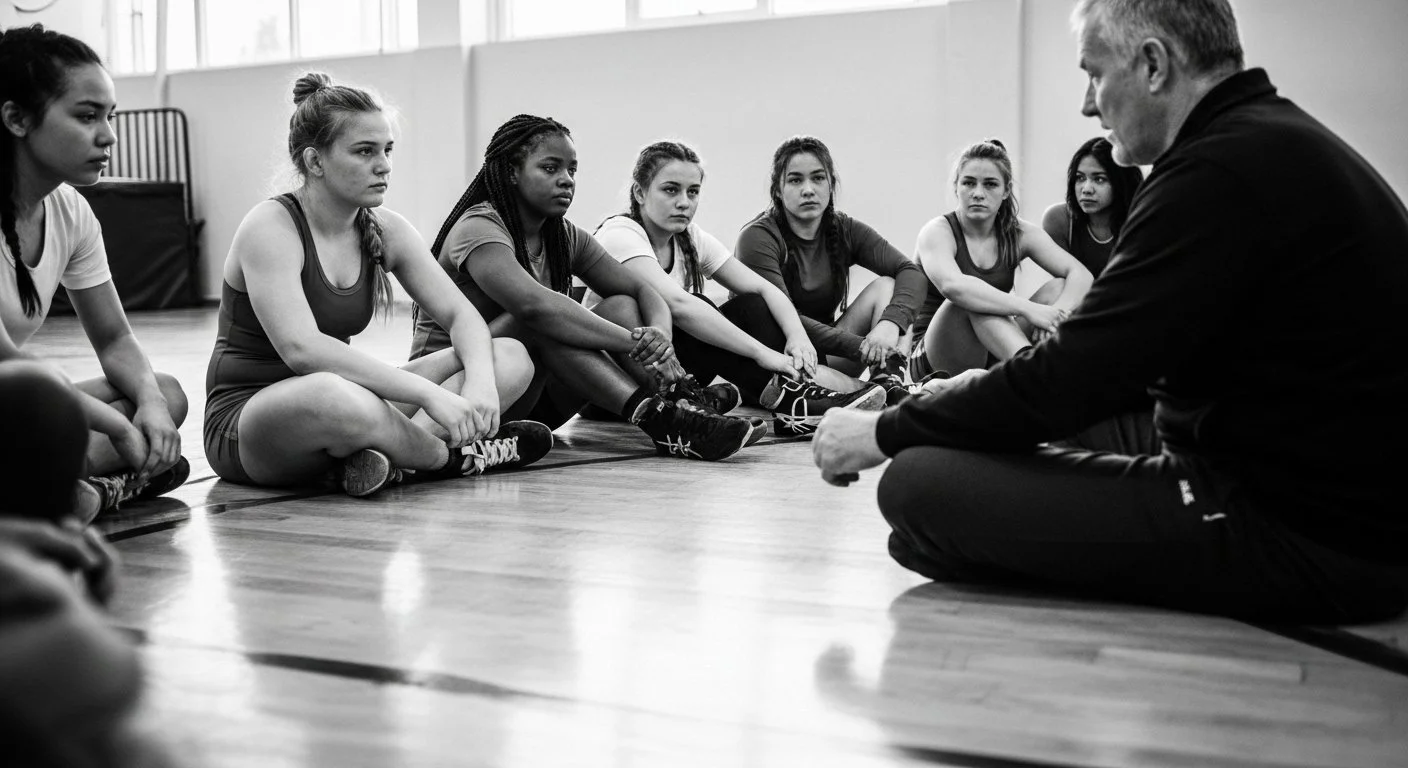Popular Topics
Why Women’s Wrestling Needs More Female Coaches
In a few weeks, I’ll begin my last season as a collegiate wrestler. Eight years have passed since I first stepped on the mat. Since then, I’ve watched women’s wrestling boom in popularity. At the high school level, the number of high school girls participating has more than doubled in the last five years.¹ And earlier this year, the NCAA officially sanctioned women’s wrestling as its 91st sport.² Tournaments are expanding, rosters are filling, and teams that once had one or two girls now have entire starting lineups. This is a historic moment.
The Coaching Advice That's Creating Mentally Fragile Wrestlers
"Tough it out." "Don't be soft." "The Champs don't complain." "Leave your emotions at the door."
Just because we have used language and trained wrestlers to “check their emotions,” it does not mean that we have created emotion-less robots. Athletes are not robots, and they do not perform on command without the right tools. They are complex humans like everyone else. And it is time we acknowledged that athletes are ALLOWED to have emotions and it isn’t going to be a threat to their performance. The very thing that is a threat to performance, is creating an environment where athletes push emotions down only for them to escape at the wrong time: in the middle of a high-tension match situation.
What You’re Missing About Coaching Girls, and Why It Matters
Coaching girls isn't the same as coaching boys. But most people don't realize that until they're in the thick of it. For Emily and Pete Dorman from No Excuses Sportswear, stepping into the world of girls wrestling opened their eyes to what was missing. Not only with proper and well fitting gear for girls, but also how we support and foster female athletes so they thrive. This conversation isn't just about singlets. It's about shifting the culture, raising the standard, and showing girls that they deserve more than being included. They deserve to be centered.
How to Build a Culture of Smart Weight Management in Your Wrestling Room
There’s a difference between extreme weight cutting and managing weight—and your team culture determines which one shows up.
As a coach, you shape more than technique and tactics. You set the tone for how your athletes view their bodies, food, and the pressure to "make weight." Coaches of female wrestlers must be hyper aware of the increased risk of eating disorders. High school female athletes are particularly vulnerable to eating disorders, with studies indicating that up to 50% of female high school athletes exhibit disordered eating behaviors, and 20–60% of female college athletes are affected.
Are You Coach Cupcake or Coach Drill Sergeant?
As a wrestling coach, have you ever wondered where you fall on the spectrum of coaching styles? Are you “Coach Cupcake,” always soft, overly accommodating, and hesitant to challenge your athletes? Or are you “Coach Drill Sergeant,” relentlessly demanding, sometimes to the point of breaking trust and respect?
Using Mindfulness to Face Your Fears in Wrestling
As athletes, we all have our fears—those little voices in our heads that say, “What if I mess up?” or “What if I lose?” Whether it’s freezing up on the mat, letting ourselves down, or worrying about disappointing our coaches, fear is something we wrestle with every day. And the truth is, it doesn’t just go away as you get better at the sport. In fact, those fears can get louder. But here’s the game-changer: you don’t have to get rid of them. You just have to learn how to live with them.
Defeating Impostor Syndrome as Female Coaches
Wrestling has a problem: women aren't coming back to coach. And when they do, they face an uphill battle because they fail to internalize their own accomplishments. This is called Imposter Syndrome, a term coined in 1978 by a clinical psychologist. It has become a buzzword in recent years, and couldn't be more relevant to the sport of women's wrestling.
5 Things to Consider When Reviewing Your Competition Performance
Hindsight is 20/20. Most of the time, we can't tell how well we have prepared for a competition until we have gone through the preparation and competition process. But with experience, you can get better at recognizing what works and what doesn't and become more self aware of when you are on or off the right track. Taking actual steps towards becoming more self aware is extremely important. If you don't already have a sport journal, GET ONE. Recording progress, workouts, results, thoughts, and feelings are so important in the steps of becoming more self aware. You'll find out how beneficial it is to have a written record of how and what you did to prepare.
Monique Cabrera: Coaching and Giving Back to the Sport
For the past decade, I have been coaching boys and girls high school wrestling. It has been easier enrolling girls to wrestle than boys because I myself am a woman, and wrestled for the high school where I am currently coaching. Feedback from the athletes has been vital in order to encourage boys and girls to wrestle for the first time. It helps me understand how I can best support their goals and keep them coming back to the mat. Typically, I ask a new athlete why they want to join the sport. There are various reasons to why a young teen wants to join wrestling: getting into shape, being more confident, but my favorite is to be a part of a family. Over the last five years I have reiterated to high school athletes that wrestling isn't just a team, but a family and a culture to help shape and support becoming a better individual all around.
Preparing for Nationals
Preparing for a national tournament takes focus, and if you have more than one major tournament each year, you will have to have a good training plan. A training plan is comprised of phases that take you through increases and decreases in volume and intensity to help an athlete peak their conditioning. Each phase below is about two weeks, but allows you to customize the time.
Read THIS to Prevent Knee Injuries
As wrestlers, we get into extreme positions. If you have knee instability, you are putting yourself at risk for tweaks, sprains, or the worst: ACL tears. The first gif shows a position I often see female wrestlers in. The knees rock in, out, or a combination of the two. This indicates that the muscles of the leg and surrounding tendons (connects muscle to bone) and ligaments (connects bone to bone) which support the knee joint are weak and compromised. If this improper knee position continues while doing jumps, weight lifting, stance drills and wrestling, you can often expect injuries.
Dear Dad, Dear Coach
My dad, Lee Allen, was a remarkable human being. Quiet and reserved, he was a two-time Olympic wrestler, arguably the most grueling sport in the world. A self-made man in every sense of the word, he grew up with nothing but the support of his family, working for everything he had.



















